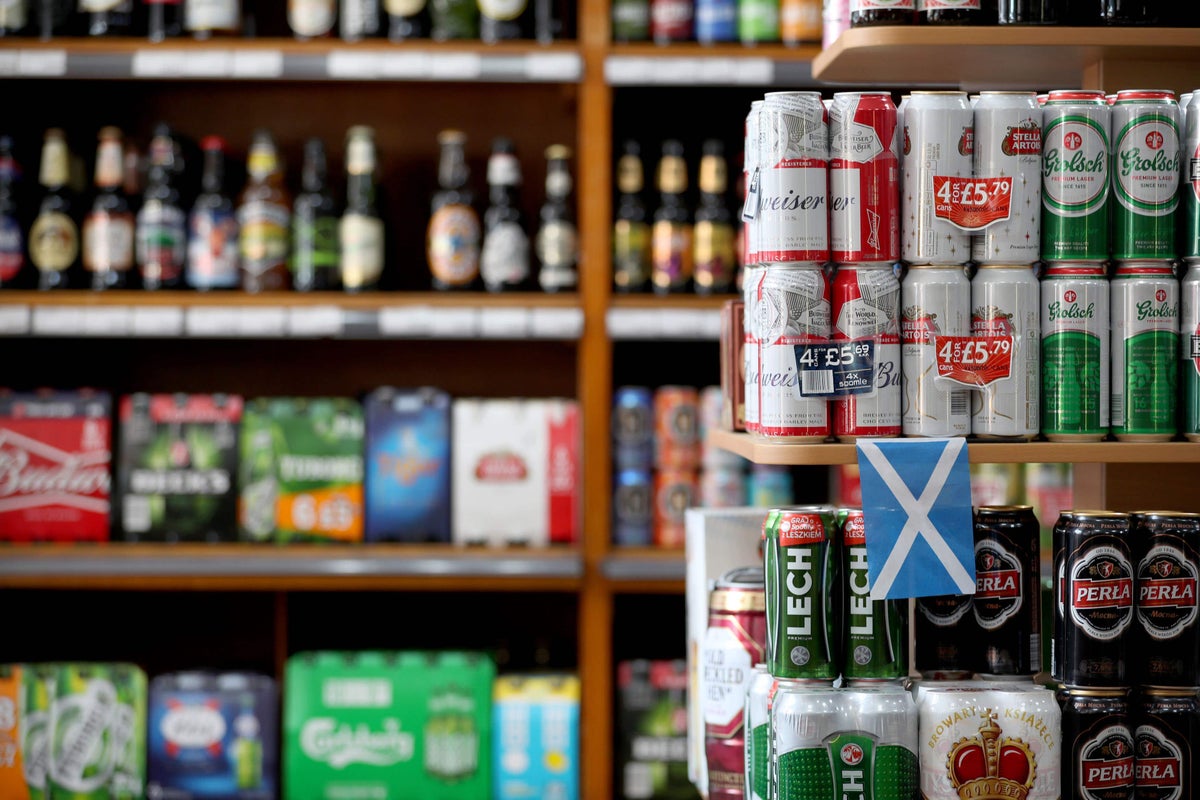
Minimum unit pricing (MUP) has reduced alcohol deaths by 13.4% since its introduction despite limited evidence of reducing consumption among low income alcoholics, a report has said.
The 50p minimum charge placed on each unit of alcohol in 2018 has had a “positive impact”, according to the independent evaluation from Public Health Scotland (PHS).
While alcohol deaths reduced by more than a tenth, the report also noted that hospital admissions due to direct alcohol consumption fell by 4.1%, with the largest reduction seen in men and those living in the 40% most deprived areas.
The report estimates there were about 150 fewer deaths on average each year, and 400 fewer hospital admissions.
Based on retail sales, a 3% reduction in alcohol consumption was seen at a population level.
This was largely driven by cider and spirits sales in off-trade products which increased the most in price.
However, the report noted evidence of negative consequences for those on low incomes who have well-established dependencies on alcohol.
The PHS report said there was “limited evidence” the scheme had reduced consumption among this group – and had even led to some prioritising spending their funds on alcohol rather than food.
But, at a population level, there had been no evidence of substantial negative impacts on social harms such as alcohol-related crime or illicit drug use, the report said.
Clare Beeston, lead for the evaluation of MUP at PHS, said more support was needed for those with complex alcohol dependencies.
She said: “We have seen reductions in deaths and hospital admissions directly caused by sustained, high levels of alcohol consumption, and this is further evidence that those drinking at harmful and hazardous levels have reduced their consumption.
Those living in the most socioeconomic deprived areas in Scotland experience alcohol-specific death rates at least five times greater than those living in the least deprived areas— Clare Beeston, PHS
“MUP alone is not enough to address the specific and complex needs of those with alcohol dependence who will often prioritise alcohol over other needs, and it is important to continue to provide services and any wider support that addresses the root cause of their dependence.
“Those living in the most socioeconomic deprived areas in Scotland experience alcohol-specific death rates at least five times greater than those living in the least deprived areas.
“Alcohol-related disorders are a leading contributor to health inequalities in Scotland.
“Overall, the evidence shows that MUP has had a positive impact on improving health outcomes, including alcohol-related health inequalities, and can play a part in addressing the preventable harm that affect far too many people, families and communities.”
Figures from 2021, the latest available, show 1,245 people died from conditions caused by alcohol – the highest since 2008.
The report will be used to help the Scottish Parliament decide whether it will continue with MUP, with a vote expected before May 2024.
Campaigners from Alcohol Focus Scotland hailed the policy as “truly life-saving”, adding the price should be increased to save more lives.
However, Christopher Snowdon, head of lifestyle at the Institute of Economic Affairs, branded the evaluation as a “whitewash”, adding that it “ignores most of the evidence from the Government’s own evaluation”.
He said it ignores the “bulk of evidence” which shows alcohol deaths are at their highest level.
Mr Snowdon added: “Minimum pricing was promoted to politicians based on speculative modelling so it is apt that a speculative model is being used to save it from the sunset clause – but minimum pricing has only ever worked in the imaginations of a handful of academics.
“It has cost Scottish consumers hundreds of millions of pounds and deserves to be ditched.”
Drugs and alcohol policy minister Elena Whitham welcomed the findings.
She said: “We’re determined to do all we can to reduce alcohol-related harm and, as this research demonstrates, our world-leading policy is saving lives, reducing alcohol harms and many hospital admissions.
“Just one life lost to alcohol-related harm is one too many and my sympathy goes to all those who have lost a loved one.
“MUP has also contributed to reducing health inequalities. The study found the largest reductions in deaths and hospital admissions wholly attributable to alcohol consumption were seen in men and those living in the 40% most deprived areas.
“We know that additional support is needed for some groups, including those dealing with alcohol dependence and issues such as homelessness.
“That’s why, alongside MUP, last year, £106.8 million was made available to Alcohol and Drugs Partnerships to support local and national initiatives.
“We will now carefully consider this research as part of ongoing work on reviewing MUP.”







